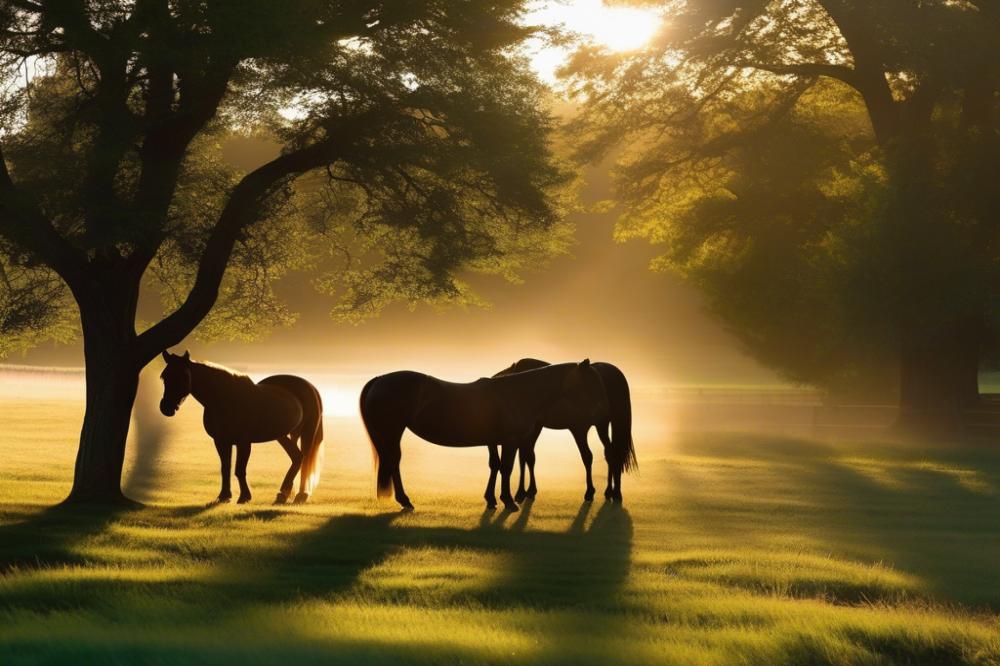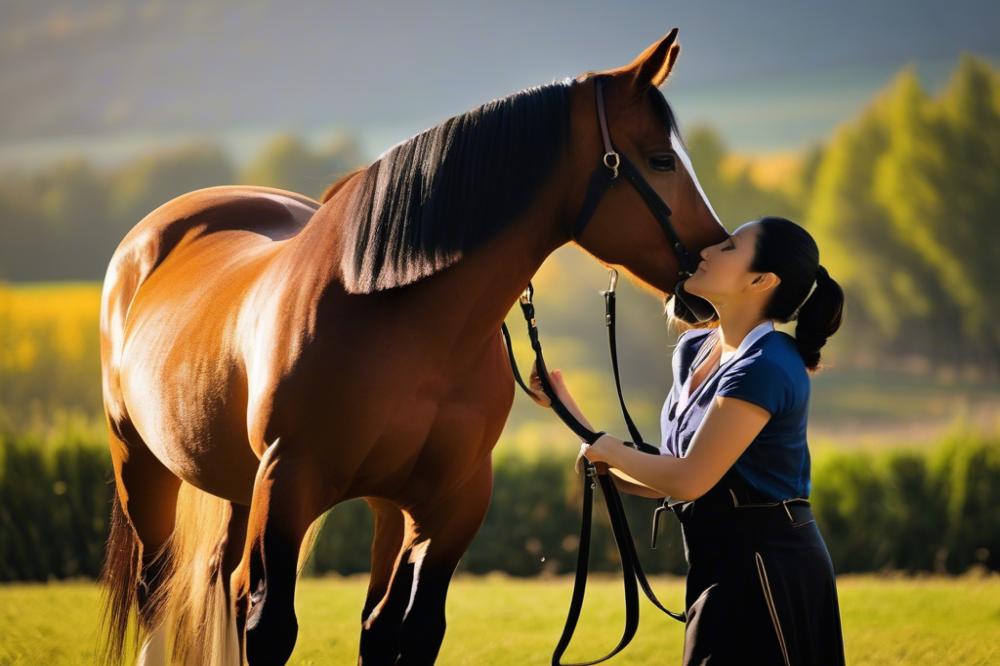Breeding for Temperament: Ensuring a Well-Behaved Horse
Understanding temperament is crucial in the world of horse breeding. A horse’s personality can significantly affect its overall behavior and response to training. An easily trainable horse can make a world of difference for both novice riders and seasoned equestrians.
Training a spirited horse can often be a challenge. Conversely, a calm and attentive horse usually learns more quickly. This is because a stable disposition allows for better focus during lessons and practice sessions. Riders can form a deeper connection with a well-tempered horse, making the experience more enjoyable for both parties.
The advantages of having a horse with a good temperament extend beyond training. Owners often find that a well-behaved horse is safer to handle. This leads to greater confidence during rides and while caring for the animal. Moreover, such horses tend to have better relationships with other horses and humans alike. Their calmness encourages positive interactions in various environments.
Ultimately, breeding for temperament plays a significant role in developing strong, versatile horses. By prioritizing personality traits alongside physical attributes, breeders can better meet the needs of riders. This approach contributes to happier, healthier horses and a more satisfying equestrian experience.
Understanding horse temperament

horse temperament refers to the intrinsic behavioral characteristics that can influence how a horse acts and reacts. It is significant in determining how easily a horse can be trained and managed, making it crucial for owners and trainers alike. A well-mannered horse tends to be safer around people and more effective in various equestrian activities.
Genetics plays a vital role in shaping temperament. Certain traits can be inherited, which means that a foal may display behaviors similar to its parents. Breeders often look for desirable qualities within bloodlines. This selection can lead to horses that are calm, willing, and eager to learn. However, not all traits are easily predictable, making temperament a complex aspect of horse breeding.
The early upbringing of a horse greatly influences how its temperament develops over time. Foals that experience positive interactions with humans tend to grow into more sociable adults. Providing consistent training and exposure to different environments can help build confidence in young horses. On the other hand, negative experiences can lead to fearful or aggressive behaviors later on. Thus, the formative years are critical for shaping a horse’s future behavior.
The Science of Equine Psychology

How Temperament Relates to Equine Psychology
Temperament is deeply connected to a horse’s psychology. Each animal has its own traits that shape how it interacts with the world. Some horses may be bold and adventurous, while others might be more cautious. These behaviors are influenced by factors such as genetics, environment, and socialization. Understanding these traits helps riders choose the right partner for their needs. Analyzing a horse’s reactions can reveal much about its emotional state. When training, recognizing these signs is essential for effective communication.
Understanding Behavioral Traits and Their Roots
Behavioral traits in horses can stem from several sources. Genetic makeup plays a significant role in how a horse acts. Breeders often select for specific traits, promoting particular behaviors. Life experiences also shape a horse’s responses. A horse that has been handled gently from a young age may exhibit calmness. In contrast, one exposed to harsh training methods might display anxiety. Training methods and early experiences can fix or modify these traits. Knowing a horse’s background helps in developing a suitable training plan.
Emotional Intelligence in Horses and Its Effect on Rider Compatibility
Horses possess a remarkable level of emotional intelligence. These animals can sense human emotions and respond accordingly. A horse that picks up on a rider’s nervousness might become more anxious itself. Being aware of this connection is vital for establishing a strong bond. Compatibility between horse and rider relies on mutual understanding. Riders must learn to read their horse’s body language to communicate effectively. A confident horse paired with a calm rider can create a harmonious partnership. Recognizing these dynamics promotes a safer and more enjoyable riding experience.
Foal Development and Temperament Assessment

Stages of Foal Development and Their Impact on Temperament
Foals go through several key stages as they grow. Each stage can influence their behavior and overall nature. From birth to weaning, foals become more aware of their surroundings. Newborns are mostly dependent on their mothers. They stay close and rely on her for warmth and food. As they grow, curiosity begins to emerge. This encourages exploration and learning.
Behavior during the weaning period is crucial. Foals separated from their mothers must adapt quickly. They experience changes that can be stressful. This stress may affect their temperament in the long run. The way a foal interacts with its environment during these early months shapes its future personality. Observing their reactions to new objects and situations offers insight into their traits.
Techniques for Assessing Temperament in Foals
Assessing a foal’s behavior can be done using specific techniques. Watching how they respond to people is an effective method. Friendly foals usually approach humans willingly. They may nuzzle or seek attention. In contrast, shy foals may retreat or display fearful behavior.
Handling exercises are also beneficial. Gentle handling helps assess reactions to touch and restraint. Engaging with a foal in a controlled environment allows evaluators to see their true nature. Additionally, using a series of standard tests can reveal temperamental traits. Testing responses to sound or movement can show how a foal might respond to common situations.
The Importance of Socialization and Early Experiences
Socialization plays a vital role in a foal’s development. Foals that interact with various animals and people tend to develop better social skills. Positive experiences can build confidence. Fostering a friendly environment encourages trust and reduces fear.
Early experiences greatly contribute to temperament. Exposure to diverse settings helps a foal learn adaptability. Horses that experience different sights and sounds early on are often more resilient. These foals are better prepared for their future roles. Creating a safe space for exploration can significantly impact their behavior. This preparation aids in developing a well-behaved horse.
The Role of Responsible Breeding
Choosing Breeding Pairs for Optimal Temperament
Careful selection of breeding pairs is crucial. Breeders should consider how each horse behaves under different circumstances. Observing their reactions to new environments and interactions with other horses provides vital information. Traits such as calmness and responsiveness can contribute significantly to foals’ temperament. Potential pairs should have proven track records of good behavior. Communication between the horses is also an important factor. Understanding their body language can reveal compatibility. This knowledge allows for informed decisions about which horses to breed.
Identifying Desirable Traits for Well-Behaved Offspring
Recognizing specific traits is essential for producing well-mannered offspring. Attributes like curiosity, trainability, and sociability are highly valued. Each of these characteristics can lead to a more enjoyable partnership between horse and rider. Additionally, a horse that is easy to handle often becomes a favorite among owners. Temperamental features can be influenced by genetics, so focusing on individuals with the right qualities is key. It is also helpful to consider the horse’s upbringing and experiences. These elements shape behavior just as much as genetics do.
Ethical Considerations in Breeding Practices
Ethical breeding practices are paramount in creating healthy equine relationships. Breeders carry a significant responsibility regarding the welfare of their animals. They must avoid prioritizing profit over the well-being of horses. Inbreeding often leads to health problems, which can affect temperament. Therefore, using a diverse gene pool helps mitigate risks. Transparency about breeding goals fosters trust with buyers and horse enthusiasts. Moreover, breeders should strive for long-term sustainability in their practices. Educating themselves and their clients about responsible ownership and training strengthens this commitment.
Training Techniques for Enhancing Temperament
Effective training techniques can greatly improve how a horse behaves. It is crucial to reinforce good behavior consistently. When a horse displays desirable actions, rewarding them promptly is essential. Giving treats, praise, or even a gentle pat can encourage continued good actions. Instant feedback helps the horse connect their conduct with a positive outcome.
Methods for Reinforcing Good Behavior
Establishing clear commands is one approach to inspire compliance. Horses thrive on routine and understanding. Using simple and consistent cues allows the horse to grasp expectations better. Practicing these cues in a calm environment will build their confidence. Gradually increasing the level of distraction can help the horse learn to maintain focus.
Utilizing Positive Reinforcement in Training
Positive reinforcement is a powerful tool in shaping behavior. This method focuses on rewarding a horse for exhibiting good traits. For instance, if a horse stands still when asked, they should receive immediate praise. This can develop trust between the horse and handler, fostering a stronger bond. Over time, the horse learns that good behavior leads to rewards.
Strategies for Addressing Behavioral Issues
Every horse may face behavioral challenges at some point. Patience is crucial when dealing with such situations. Identifying the root cause of the behavior is the first step. Whether it’s fear, boredom, or discomfort, understanding leads to better solutions. Once the reason is clear, approaches can be tailored to suit the specific issue. For fear, gradual exposure to the triggering factor can help. Boredom may call for more engaging activities or varied riding exercises. Offering mental stimulation through groundwork or agility tasks often benefits a horse struggling with engagement.
Consistency across training sessions is vital. Horses respond poorly to mixed signals. Therefore, trainers should communicate clearly and maintain the same approach. Any negative behaviors should be redirected rather than punished. Redirecting involves guiding the horse toward more appropriate actions instead of scolding them. This can turn problematic habits into learning moments.
Final Thoughts on Breeding for Temperament
Breeding for temperament is vital in producing well-behaved horses. A horse’s behavior can significantly affect its interactions with riders and handlers. Selecting parent horses that exhibit calm and manageable traits lays the groundwork for future generations. Good temperament can make training more effective and enjoyable for both the horse and the rider. It often leads to a safer environment in stables and during rides.
Responsible breeding practices are essential in promoting these positive traits. Breeders must focus on genetic lines that prioritize character, not just physical appearance. Evaluating behavior in potential breeding stock is paramount. Choosing horses that have shown good responses to training will lead to offspring that can adapt to various situations more easily. This commitment to thoughtful breeding can prevent future behavioral issues.
In closing, the journey to develop well-behaved horses starts with careful breeding choices. Every horse has its own personality, but those traits can be shaped by the right lineage. Breeders, trainers, and owners must work together to instill good manners in horses from an early age. Through shared dedication and understanding, we can foster equine companions that are not just beautiful, but also a joy to handle and ride.



